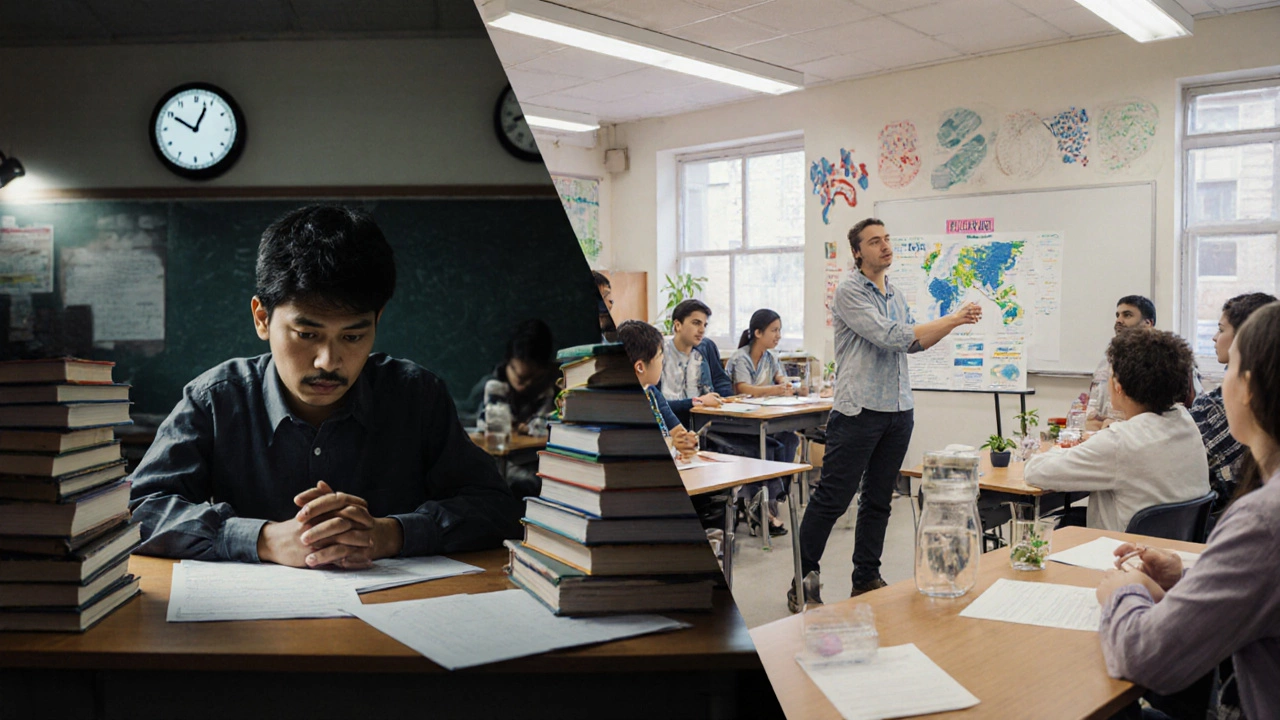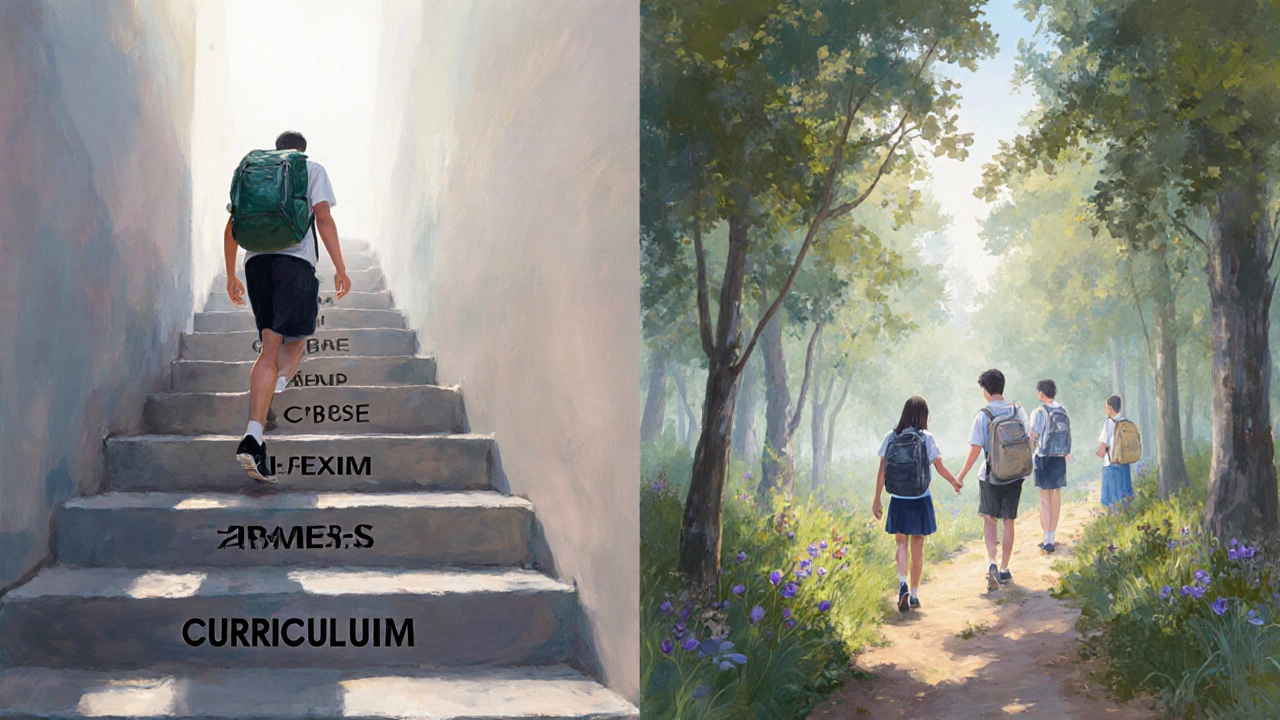Nov
21

- by Dhruv Ainsley
- 0 Comments
Which Education System Matches Your Learning Style?
Answer 5 questions to find out which educational system aligns best with your strengths. Based on your responses, we'll identify whether CBSE or the American system would better suit your learning preferences.
Your Results
Parents in India often wonder: is the American school system easier than CBSE? The answer isn’t simple. It’s not about difficulty-it’s about what kind of learning each system values. CBSE pushes students to master content deeply, while American schools focus on applying knowledge in real-world ways. One isn’t easier. They’re just different.
What CBSE Actually Demands
CBSE, the Central Board of Secondary Education, runs one of the largest school systems in the world. Over 20,000 schools in India and abroad follow it. The syllabus is standardized, tightly structured, and exam-driven. By Class 10, students are expected to memorize and reproduce detailed content in subjects like Physics, Chemistry, and Biology. For example, in Class 10 Science, students must know the exact chemical equations for reactions, the steps of photosynthesis, and the laws of motion with numerical problem-solving.
The board exams at the end of Class 10 and Class 12 are high-stakes. A few marks can change a student’s future. There’s little room for creativity in answers. Examiners look for keywords, structured responses, and accurate formulas. Students spend hours solving past papers, attending coaching centers, and drilling formulas. The pressure isn’t imaginary-it’s built into the system.
Mathematics in CBSE is rigorous. By Class 12, students tackle calculus, matrices, probability, and linear programming. The questions are predictable but require precision. One wrong step, and you lose the entire mark. There’s no partial credit for thinking process. You either get it right or you don’t.
How American Schools Structure Learning
In the U.S., there’s no single national curriculum. Each state sets its own standards. But most public schools follow Common Core or similar frameworks. The focus isn’t on memorizing facts-it’s on understanding concepts and using them. A U.S. science class might ask: "How would climate change affect local ecosystems?" instead of "Define greenhouse effect."
Students are graded on projects, presentations, class participation, and homework-not just one final exam. In a typical high school biology class, a student might design an experiment on plant growth under different light conditions, write a lab report, present findings to classmates, and then take a short quiz. All of it adds up to their final grade.
Math in American schools is different too. Algebra and Geometry are still taught, but the emphasis is on problem-solving strategies. Students use calculators freely. They’re encouraged to explain their reasoning in writing. A question might ask: "Why does this method work?" instead of "Solve for x."
There’s also more flexibility. Students can choose electives-art, drama, coding, psychology, even cooking. By senior year, many take Advanced Placement (AP) courses, which are college-level. But even those are less about memorization and more about critical thinking. An AP History exam doesn’t just test dates-it asks you to analyze primary sources and argue a position.
Grading: One Test vs. Many Efforts
CBSE’s grading is almost entirely based on final exams. Class 12 board results are the deciding factor for college admissions. Even if a student does well in class throughout the year, a bad exam day can ruin everything.
In the U.S., grades come from multiple sources: homework (15%), class participation (10%), quizzes (20%), projects (25%), and final exam (30%). This spreads the pressure. One low score doesn’t sink you. You can recover. Students aren’t defined by a single day.
This doesn’t mean American students work less. They just work differently. Instead of cramming for months, they manage smaller tasks over time. A student might spend three weeks on a science fair project, writing drafts, testing ideas, and revising. That’s not easy-but it’s not the same kind of stress as CBSE’s board exam crunch.

Language and Communication: A Hidden Difference
CBSE teaches English as a subject, not a medium of thinking. Students learn grammar rules, vocabulary lists, and how to write essays in a fixed format. But many don’t use English daily outside class. In contrast, American students use English for everything-discussions, debates, group work, presentations. They’re not just learning the language; they’re living it.
This affects confidence. A CBSE student might know all the vocabulary for describing an ecosystem but freeze when asked to explain it aloud. An American student might struggle with perfect grammar but can talk confidently about the topic. Neither is "better." But the skills they build are different.
What Students Actually Experience Day to Day
Picture a CBSE student’s typical week: 6-7 hours of school, 2-3 hours of homework, then 2 more hours of coaching. Weekends are for revision. There’s little time for hobbies. The goal is to score high, not to explore.
Now picture an American student: 6-7 hours of school, but homework varies. Some days it’s reading a novel. Other days it’s designing a poster. There’s a club meeting after school. Maybe they’re working on a robotics project. They have time to be bored, to think, to change their mind about what they like.
One isn’t more stressful than the other. But CBSE stress comes from fear of failure in a single moment. American stress comes from managing many small deadlines. One is a sprint. The other is a marathon with checkpoints.

Which System Prepares You Better for College?
If you’re aiming for Indian engineering or medical colleges, CBSE is the clear path. The syllabus matches the entrance exams-JEE, NEET. If you’re studying in India, CBSE gives you the tools to win those tests.
If you’re planning to study abroad, especially in the U.S., Canada, or Europe, American-style learning helps more. Universities there don’t care about your 12th-grade percentage. They look at your essays, your extracurriculars, your ability to think independently. They want students who can write, speak, and solve problems-not just recite facts.
Many Indian students who move to the U.S. for college struggle not because they’re not smart. They’re used to being told what to think. They’re not trained to ask questions, challenge ideas, or argue their point. That’s the gap.
So, Is American Syllabus Easier?
No. It’s not easier. It’s just less punishing.
CBSE asks you to know everything perfectly. One mistake, and you lose points. American schools ask you to think deeply, even if your answer isn’t perfect. They reward effort, curiosity, and growth.
If you thrive under pressure and like clear rules, CBSE might feel more comfortable. If you prefer flexibility, creativity, and learning by doing, the American approach might suit you better.
The real question isn’t which is easier. It’s: which one prepares you for the life you want to live?
Is CBSE harder than the American curriculum?
CBSE is more rigid and exam-focused, with high-stakes board exams that determine college admissions. The American system spreads assessment across projects, participation, and multiple tests. Neither is objectively harder-it’s just that CBSE’s pressure is concentrated in a few exams, while American schools require consistent effort over time.
Which syllabus is better for studying abroad?
The American curriculum is generally better for studying abroad because it emphasizes critical thinking, writing, and project-based learning-skills U.S. and European universities look for. CBSE students often need to adjust to asking questions, forming opinions, and working independently in college, which aren’t as heavily trained in the Indian system.
Do American schools teach less content than CBSE?
No. American schools cover similar core content in math and science, but they teach it differently. Instead of memorizing formulas, students learn how to apply them. For example, a U.S. physics class might use a roller coaster to explain energy conservation. CBSE teaches the same concept through textbook problems. The depth is comparable, but the approach isn’t.
Can a CBSE student succeed in the U.S. education system?
Absolutely. Many CBSE students excel in U.S. universities. But they often need to develop skills like public speaking, independent research, and time management-areas where the American system naturally builds experience. With support and practice, the transition is very possible.
Is the American curriculum less stressful?
It’s less about one high-pressure moment and more about managing ongoing tasks. CBSE students face intense stress before board exams. American students deal with constant deadlines, but they have more chances to improve. Neither is stress-free-but the nature of the stress is different.
Do American schools have homework like CBSE?
Yes, but it’s different. CBSE homework is usually practice problems or textbook exercises. American homework often includes reading, writing reflections, group projects, or preparing presentations. It’s less about repetition and more about applying ideas.





